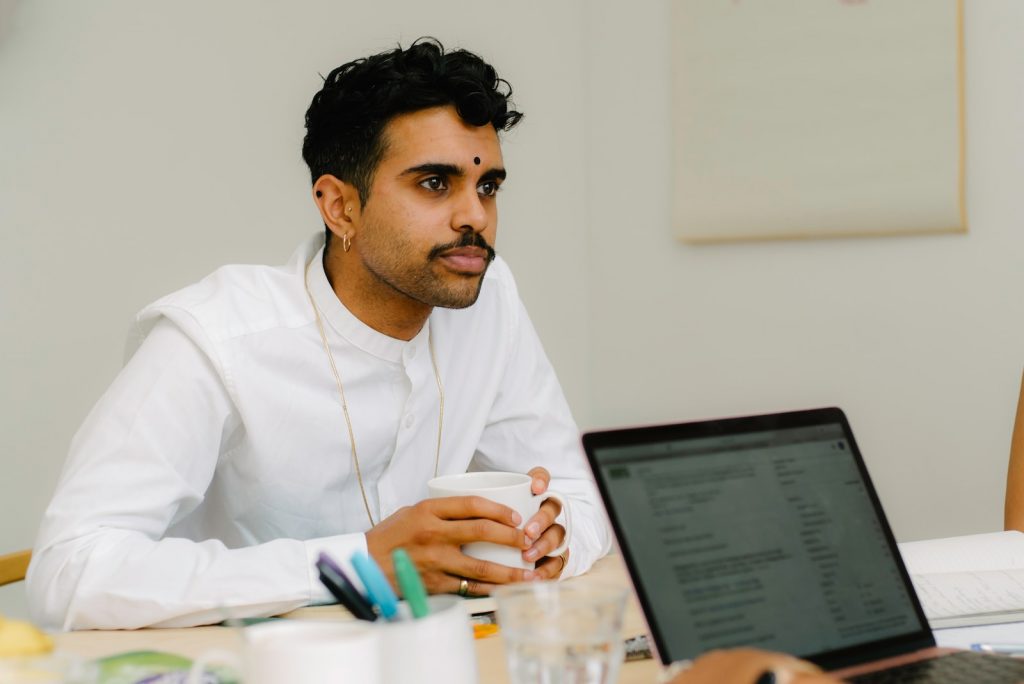6 Principles
Each and every one of us can actively work every day to create an inclusive, more equitable and tolerant environment where all people feel valued and significant.

Taking responsibility: Our 6 principles for more diversity
Everyone is unique and this diversity helps enrich our lives in very different ways. In theory, this will be obvious to most – in practice, however, there is still a lot to do to make diversity, equal opportunity and inclusion (DC&I) a reality. At MoreDiversity, we want to highlight the various construction sites on the way there and let people have their say who are committed to DC&I or bring experiences and ideas that help us better understand DC&I. Because only together can we find new solutions to the problems and challenges of our time, be it in private or professional contexts, in education, science, politics, culture or media.
We have set up 6 principles that can help you in very different ways to integrate more diversity into your everyday life. They are meant to provide you with guidance and support, raise your awareness and motivate you to adapt your mindset and actions to actively contribute to an inclusive and diverse society.
Don’t know where to start? Don’t worry – we have something for you!
Principle #1 Empathy
Empathy is an essential component of social intelligence. Those who are empathic have the ability to understand other people’s perspectives, thoughts, and emotions. Empathy is the ability to put yourself in the shoes of others and respect their needs and feelings.
Especially in an increasingly diverse society, empathy is an incredibly important quality, as each of us brings with us very different perspectives and life experiences. Only when we make an effort to put ourselves in the shoes of others can we reduce conflict and create a sense of unity and belonging.
Our blogpost “Empathy – the key to an inclusive & tolerant society” addresses the importance of teaching empathy to children at an early age. But the blogpost also discusses the importance of an empathetic leadership style in the workplace and in politics. After all, empathy can help reduce the challenges of division and discrimination, defuse conflict, and enable peaceful coexistence.
Learn more now about this core competency that individuals and organizations must develop to create a compassionate and inclusive world.
Principle #2 Reflectiveness
In addition to empathy, reflectiveness is also of great importance. It is the ability to reflect on one’s own thoughts, feelings and actions and to observe oneself. To question oneself self-critically and to examine one’s own actions, thus recognizing and, if necessary, changing stuck patterns of behavior.
We believe that being reflective plays a very important role in addressing structural problems in our society. By becoming aware of the privileges we enjoy and how we ourselves have internalized biases and stereotypes, we can focus on shifting our thoughts and actions into the positive.
In our blog post “Only those who are honest with themselves can change the system”, we show how racism and sexism can have an impact on the world of work and the shortage of skilled workers. Therefore, we at MoreDiversity call for a fundamental change in terms of work models to create a more flexible and equitable working world. Interested?


Principle #3 Openness

In uncertain times like these, solidarity is essential for a diverse society to thrive. Openness is a skill that can help us understand each other better and develop more empathy for each other. It means being attentive and interested in new people and situations, being willing to listen and engage in dialogue, and learning new things.
Openness allows us to set aside our rigid attitudes and prejudices and embrace new perspectives and ideas. We can build deeper relationships with others, understand ourselves better, and expand our horizons.
Openness is not always easy, but it is essential to building an inclusive, empathetic, and compassionate society. In our blog post “On the importance of openness in today’s society,” we give you more background on the topic and some useful tips on how to practice openness and integrate it into your everyday life.
Principle #4 Respect
For us at MoreDiversity, respect is the basis for ethical behavior and for good personal as well as professional relationships. This includes recognizing differences, understanding their meaning, and treating other people with interest and courtesy.
In our blog post “Are you still tolerating or already respecting?” we use the example of the workplace to show why mutual respect is so important – from accessibility and netiquette rules to verbal and written communication and behavior towards colleagues.


Principle #5 Courage
Can you remember the last time you did something for the first time? And if so, how did it feel for you, and did you have to muster up courage to do it? Especially in difficult or uncertain situations, a large dose of courage helps us move into action despite fear and doubt. It’s about facing challenges, taking risks and standing up for your convictions, even if it’s sometimes uncomfortable and can pinch quite a bit. But only by stepping out of your comfort zone again and again can personal growth be fostered and change brought about.
We think it’s worth embracing the unknown to break through barriers and make tomorrow’s world a better place. Through courage, it is possible to overcome prejudices against other people and avoid discrimination and division in society.
In our blogpost “Courage: Why you should embrace the unknown”, we give you tips on how to recognize and overcome your prejudices.
Principle #6 Commitment

Our last, and yet so important, principle is commitment, meaning giving time, energy and resources to a specific issue. It is critical that we are willing to take responsibility and contribute to make a difference.
There are so many different ways to do this, from participating in protests to volunteering for social or environmental projects. It’s important to figure out which issues are most important to you and where you can and want to get involved. In our blogpost “Only if we act, we can make a difference – How our personal engagement drives change in our society” we give you ideas on how to discover your talents and skills and thus support people and organizations that urgently need help. Because every little step counts.
The world is on the path to a more equitable, diverse and inclusive planet - but there is still much to do.
Our 6 principles are designed to get you thinking about diversity and taking action, because each individual can actively work every day to create an inclusive, more equitable, and tolerant environment where all people feel valued and significant.
So – what are you waiting for?
